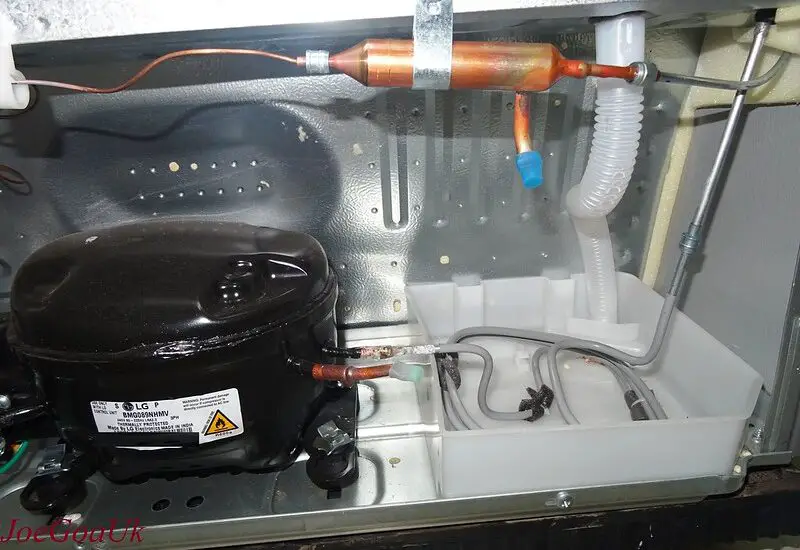Ah, the humble refrigerator compressor, the trusty component that keeps your perishables preserved. Ever paused to consider its role? Well, it’s central to your fridge’s operation, shouldering the task of regulating temperatures to prevent your food from turning into a science experiment. It’s the maestro of the refrigeration cycle, orchestrating a complex cooling process with exceptional ease. By comprehending the various types of refrigerator compressors, you’ll gain valuable insights that could prove useful during your next refrigerator purchase or repair.

Table of Contents
What is a Refrigerator Compressor?
Definition and Purpose
The refrigerator compressor is more than just a motor-powered pump; it’s the linchpin that ensures your fridge maintains the perfect climate for your edibles. By driving refrigerant around the cooling system, it absorbs heat from the inside and expels it externally, much like a temperature-regulating courier. The refrigerator compressor’s role is, therefore, pivotal in sustaining the frosty environment crucial for preserving your food.
Understanding Compressor Operation
Imagine this: a refrigerator compressor acts like a sponge, soaking up refrigerant gas from the fridge’s interior. Then it compresses, or should we say ‘squeezes,’ this gas, elevating its temperature significantly. Next, this hot gas meanders to the condenser, shedding its heat and morphing back into a liquid. And then? The cycle repeats, maintaining a constant chill in your fridge. So, the compressor is not just a component; it’s a dedicated guardian ensuring your refrigerator’s effective operation.
Types of Refrigerator Compressors
Reciprocating Compressors
Reciprocating compressors might remind you of a mini car engine, featuring pistons, a cylinder, and valves. Picture a piston rhythmically moving up and down in the cylinder. This movement sucks in the refrigerant, compresses it, and discharges it into the condenser. It’s like the beating of a heart, maintaining the lifeblood of your refrigerator’s cooling system.
There’s a reason why reciprocating compressors are so common. They’re reliable, capable of withstanding the test of time, and their repair won’t cost you an arm and a leg. But it’s not all roses; they can get a little noisy, and their lifespan may not match some other compressor types.
Rotary Compressors
Imagine a rolling pin rolling out pastry. Now replace that pastry with gas—that’s essentially what a rotary compressor does. It uses a rolling action to draw in the refrigerant and compress it. In comparison to a reciprocating compressor’s back-and-forth motion, a rotary compressor offers a more continuous and smooth flow, reducing wear and tear.
Riding on the advantages of its design, a rotary compressor operates quietly and provides enhanced efficiency, becoming a darling of modern fridges. However, it’s not without its Achilles’ heel – the repair or replacement cost is usually higher, which can be a bit of a bummer when it breaks down.
Scroll Compressors
A scroll compressor functions like a well-orchestrated dance. It has two spiral-shaped pieces that fit together. As one piece moves in a circular path, it compresses the refrigerant within the spirals. The elegant dance between the two scrolls efficiently compresses the refrigerant, creating a consistent flow toward the condenser.
The advantages of scroll compressors are plentiful: they’re quiet, efficient, and known for their reliability. However, they are also more complex, which can lead to more costly repairs. But considering their benefits, many see them as worth the investment.
Centrifugal Compressors
Think of a centrifugal compressor as a mini whirlwind. It draws in refrigerant and uses a spinning motion to accelerate and compress the gas. It’s like a playground roundabout but for refrigerant, spinning at high speed and creating a dynamic flow of gas.
Centrifugal compressors are the superstars when it comes to large refrigeration systems, providing high efficiency and capacity. However, they can be overkill for smaller household fridges and are usually more expensive to install and maintain. But in the right setting, they’re worth every penny.
Check out these other related articles…
Fridge Compressor Noise: A Detailed Guide
Testing a Refrigerator Compressor: Your Essential Guide
Freezer Compressor Not Running: How to Fix
Fridge Compressor Hot but Not Running: Causes & Solutions
Refrigeration Compressor Troubleshooting: Your Easy Guide
Selection Criteria for Refrigerator Compressor Types
Energy Efficiency
Energy efficiency is the name of the game in our increasingly eco-conscious world. It’s crucial to weigh the energy consumption of different compressor types. Scroll and centrifugal compressors, for instance, often outperform their reciprocating and rotary counterparts in this department.
Noise Level
Nobody wants a fridge that sounds like a tractor, right? Noise level is another critical factor. Here, rotary and scroll compressors typically offer quieter operation than reciprocating ones, keeping your kitchen peaceful.
Cost and Maintenance
The initial cost and maintenance of your compressor can influence your overall refrigerator expenses. While reciprocating compressors are usually cost-effective, scroll and centrifugal types can be pricier but offer longer-term benefits.
Lifespan and Durability
The lifespan and durability of your compressor could be the difference between a fridge that lasts a decade or one that gives up the ghost prematurely. Rotary and scroll compressors are generally more durable, ensuring your fridge remains your trusty kitchen companion for years to come.